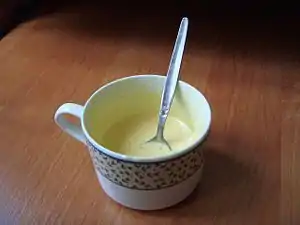Kogel mogel
Kogel mogel (Yiddish: גאָגל-מאָגל gogl-mogl; Polish: Kogel mogel; Norwegian: Eggedosis; German: Zuckerei; Russian: Гоголь-моголь gogol-mogol) is an egg-based homemade dessert popular in Central and Eastern Europe, as well as in Caucasus. It is made from egg yolks, sugar, and flavourings such as honey, vanilla, cocoa or rum, similar to eggnog or zabaione. In its classic form it is served slightly chilled or at room temperature. Served warm or hot, it is considered a home remedy for sore throats. Variations include milk, honey and soda.[1][2]
 A dish of creamy homemade Kogel mogel | |
| Alternative names | Gogol-mogol, gogle-mogle |
|---|---|
| Course | Dessert |
| Place of origin | Jewish communities of Central and Eastern Europe |
| Serving temperature | Chilled or room temperature |
| Main ingredients | Egg yolks, sugar |
| Variations | add orange juice for a taste similar to an Orange Julius |
History and etymology
Kogel mogel became known by this name by the 17th-century Jewish communities of Central Europe.[3] It may have its roots in the Jewish code of law called the Shulchan Arukh[4] where one is allowed to consume sweet syrup and/or raw egg on Shabbat to make one's voice more pleasant.
Vasmer's dictionary mentions different hypotheses on the origin of the name such as English hug-mug, hugger-mugger, or German Kuddelmuddel.[5]
The dessert was made popular during the communist era food shortages, including sugar.[6] It is still eaten in Poland and in Polish communities around the world.
Preparation
The dish consists of raw egg yolks and sugar, beaten and ground until they form a creamy texture, with no discernible grains of sugar. In modern kitchens, it is often mixed in a blender until it changes color and becomes thick. A classic single gogl-mogl portion is made from two egg yolks and three teaspoons of sugar beat into a cream-like dish. Variations can be made by adding chocolate, vodka, rum, honey, vanilla, lemon juice, orange juice, raisins, whipped cream, or a number of other ingredients based on one's own taste preferences.
Uses
Kogel mogel is often prepared as a transition food for babies moving from a cereal diet to one that includes eggs and other soft foods. It is also a folk medicine used for treating colds or flu, particularly chest colds and laryngitis. Kogel mogel is ranked highly among other traditional cold remedies such as chicken soup.
The traditional usage of kogel mogel as a home remedy for treating a sore throat is supported by research done in Israel.[7][8] The simplest form of preparation as a remedy is with no egg, but only honey added to warm milk. More commonly, a single raw egg is added to a cup of warm milk and mixed with a tablespoon of honey.
Cultural references
In the German translation of Lewis Carroll's Alice's Adventures in Wonderland, Humpty Dumpty is called Goggelmoggel.
In the 1985 film of Doctor Aybolit from the Soviet Union, Doctor Aybolit nurses sick pirates and animals back to health by giving them kogel mogel.
Kogel-mogel is a Polish 1988 comedy of manners film directed by Roman Załuski, starring Grażyna Błęcka-Kolska and Ewa Kasprzyk.
A similar sounding phrase, Great Googly Moogly, an apparent euphemism for "Great God Almighty,", appears in a Howlin' Wolf song, "Goin' Down Slow", and in the work of Langston Hughes, and was later more generally popularized by Frank Zappa and Mr. Magoo.
See also
- uovo sbattuto – Italian breakfast
- Eggnog
- Rompope – Eggnog-like drink from Latin America
- Advocaat – Dutch alcoholic beverage featuring eggs
- Zabaione, also known as Zabaglione – Italian dessert made with egg, sugar, and wine
- Coquito – Puerto Rican rum and coconut milk cocktail
- Eierpunsch – A warm, sweetened alcoholic, egg-based drink
- List of custard desserts – Wikipedia list article
- List of desserts – Wikipedia list article
- Ponche crema – A cream liqueur from Venezuela and Trinidad and Tobago
- Floating island – Dessert made with meringue and crème anglaise
References
- Prevention, Alternative Health, Bubbes Remedies, Jewish Genetic Diseases, Jewish Medical Ethics
- Petrosian, Irina; David Underwood (2006). Armenian Food: Fact, Fiction & Folklore. Bloomington, Indiana: Yerkir Publishing. p. 243. ISBN 978-1-4116-9865-9. OCLC 70219314.
- "Polish Kogel Mogel Is a Spin on Eggnog". Retrieved 24 August 2018.
- Halacha-Yomi - Torah.org Archived 2011-06-04 at the Wayback Machine
- М. Р. Фасмер. Этимологический словарь русского языка. Прогресс, 1964—1973. Гоголь-моголь (Max Vasmer, Etymological dictionary of the Russian language).
- Jackson, John E.; Klich, Jacek; Poznanska, Krystyna (2005-06-06). The Political Economy of Poland's Transition: New Firms and Reform Governments. Cambridge University Press. ISBN 978-1-139-44415-6.
- Dr. Samuel Givon, an internal medicine expert of the Israel General Medical Service, says that research proved warm kogel mogel does assist with an antibiotic effect, by widening the blood vessels in the throat, thus bringing more blood and antigens to the inflamed area, thus hastening the recovery
- Grandma gave you Gogle Mogle? It really works! (Hebrew, Ynet article)